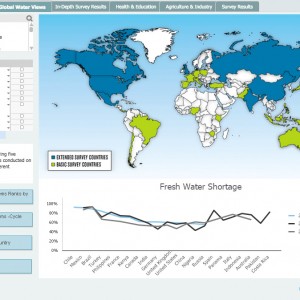Federal Water Tap, January 24, Part 2: Energy and Climate
Solar Review
The deadline for submitting public comments on the Bureau of Land Management’s broad environmental review of solar energy development in six western U.S. states is Friday. The review will result in changes to the agency’s resource management plans, allowing it to concentrate solar energy projects on the most suitable parcels of land. Comments can be submitted via this link.
Clean Water Act
Four Republican members of Congress—Sens. James Inhofe (Okla.) and Jeff Sessions (Ala.) and Reps. John Mica (Fla.) and Bob Gibbs (Ohio)—wrote a letter to the head of the U.S. Environmental Protection Agency, claiming that, in negotiating settlements for several lawsuits, the agency is exceeding its authority under the Clean Water Act. The letter requests the EPA to justify its actions. At issue are settlements over groundwater regulation and water pollution from nonpoint sources.
Water Infrastructure
In a letter to the White House budget director, Senator Kirsten Gillibrand, a New York Democrat, urged Jacob Lew to allocate more money in the fiscal year 2013 budget to two federal loan programs for water and sewer infrastructure. Gillibrand called for a nearly 50 percent total increase to the Drinking Water State Revolving Fund and the Clean Water State Revolving Fund. The text of the letter follows the press release from the senator’s office.
Air Quality, Energy and Water
The National Renewable Energy Laboratory released a study on the effects of stricter air pollution controls for a key Arizona power plant. The EPA is considering haze-reduction technology for the coal-fired Navajo Generating Station, which provides some 92 percent of the low-cost power to pump Arizona’s share of the Colorado River.
NREL found that the two proposed options—selective catalytic reduction (SCR) and SCR plus baghouses and sorbent injection—would cost less than shutting the plant down and replacing the power with existing spare capacity. The study also found that using SCR controls, water rates for agricultural users would increase between 13 percent and 16 percent; using SCR technology with baghouses and sorbent injection would double the effect.
Weather 2011 and Consolidation
The National Oceanic and Atmospheric Administration (NOAA) published its review of the year’s weather events and climate trends. All sorts of records were broken. Texas had its second warmest and its driest year on record. The data from the September to December period, however, has not yet been made final.
As part of a broader government re-organization, President Barack Obama proposed moving NOAA from the Commerce Department to the Interior Department, the Wall Street Journal reports. Many environmental groups opposed the move, arguing NOAA’s mission and culture does not fit with Interior’s focus on natural resources development.
Climate Adaptation
The Obama administration released a draft plan for adapting to the effects of climate change on fish, animals and plants. The national strategy is directed toward all resource management decisions, not just those made by the federal government. A public comment period is open through March 5. The final plan will be released by early summer.
Water to the Supreme Court?
A Texas water district asked the U.S. Supreme Court to hear its lawsuit to gain access to water in Oklahoma, the Fort Worth Star-Telegram reports. The Tarrant Regional Water District, which serves nearly 2 million customers west of Dallas, sued the state of Oklahoma in 2007 to acquire water. The Supreme Court has yet to decide whether it will hear the case.
The Motion of the Ocean
The U.S. Department of Energy released assessments of the power potential of wave energy and tidal energy in the United States. The west coast has greater recoverable resources than the east coast—though Alaska beats them both. Alaska also does well in tidal energy.
Federal Water Tap is a weekly digest spotting trends in U.S. government water policy. To get more water news, follow Circle of Blue on Twitter and sign up for our newsletter.
Brett writes about agriculture, energy, infrastructure, and the politics and economics of water in the United States. He also writes the Federal Water Tap, Circle of Blue’s weekly digest of U.S. government water news. He is the winner of two Society of Environmental Journalists reporting awards, one of the top honors in American environmental journalism: first place for explanatory reporting for a series on septic system pollution in the United States(2016) and third place for beat reporting in a small market (2014). He received the Sierra Club’s Distinguished Service Award in 2018. Brett lives in Seattle, where he hikes the mountains and bakes pies. Contact Brett Walton





Leave a Reply
Want to join the discussion?Feel free to contribute!